There was a time not that long ago when I didn’t think much about aging because I took for granted that the face I saw looking back at me in the mirror seemed little changed year after year. I would search my reflection for any signs of aging and would spot a few fine lines, but mostly when I smiled and only if I looked carefully in the round magnified mirror that’s attached to the bathroom vanity.
I was always able to get away with a certain ambiguity about my age, in the same way my children seem able to float between their two races depending on the context of who they’re with and where they are. I don’t really have a sense of just how old I look now, but judging by reactions of most people I tell and because of my luck with genetics and race, I’m guessing that I can still pass as someone younger. I have leveraged this to my benefit to some degree in this ever-ageist society where there seems to be no space or relevance for women my age.
Our culture celebrates and worships the young. At some point over 40 you start feeling erased. Michelle Yeoh recently said in her Golden Globes speech, “as the days, years, and numbers get bigger, the opportunities get smaller.” She might have been referring specifically to her industry and the number of roles available that’s appropriate for an actress her age (we should all be so lucky if we looked anywhere near as good as she does at 60!), but her words ring a greater truth for us all. As women, some of us spend a fortune on skin and haircare, watch what we eat to stay healthy and fit, and choose our outfits with care. Perhaps it’s all in the name of vanity, but it’s also in the name of survival.
Being middle aged is like going through the painfully awkward early teen years again when you wanted puberty to be done and over with just so that you could get to the other side. But instead of puberty, we undergo the equally havoc-wrecking and hard-to-pin-down-exactly-how-long-this-will-last phase of life that is pre-menopause even before we get to menopause. Basically, we get to live through this period of hormonal wackiness for a really long time. We are neither young nor old and many of us may dream of reaching that “fuck it, I don’t care what anybody thinks” stage of our experienced years, but we live in a culture where our hard earned experience and wisdom doesn’t seem to hold as much value and we start losing cultural relevance. Fresh, youthful exuberance remains the holy grail and youth equals beauty in our society. This is all the more reason we shouldn’t care, right? So why is this hard sometimes?
Becoming an ajumma
There’s this old meme that’s been around forever about the aging timeline of Asian women. It’s one of the funniest things because it’s so damn accurate. Maybe you’ve seen it? If you haven’t, here it is for your reference:
According to this meme, I am around the “menopause kapow!!!” stage of aging, which means I am somewhere between the the bun-wearing Asian mother and the bosom-heavy ajumma with the 파마 (“pama” or Korean perm or the Ajumma Special hairstyle). There’s a reason why there is no illustrated depiction of a woman in the age of menopause. This state of transition between your 50s and 60s is when women often feel invisible.
In Korea, ajumma, is a word for a middle-aged married woman (so…basically me), and the iconic, short permed hairstyle is the crowning physical attribute of what makes a woman look like an ajumma (ok, not me…yet). But being an ajumma isn’t strictly defined by your age or style—it’s more of a state of mind, and younger woman may sling the term towards another younger woman as something of an insult because stereotypically, ajummas are often described as boisterous, nagging, and bossy. But they are also hardworking and caring, so depending on the context, they can be either endearing or meddlesome.
I remember when my own mom got her ajumma perm back around when my brother was born. Incidentally it was also when she turned thirty. This is how it starts: a woman begins to have children and decides to cut her hair short with a perm. It’s all about low maintenance and practicality. The curls often start off loose, just to give the hair some volume, but as the years go on, the curls become tighter and the hair shorter because tighter curls last longer. That’s a time and money saving tactic right there. I also remember that after I had my first baby, my mother asked if I was going to cut my hair and get a 파마 (the perm). Not surprisingly, I balked at this question. I do believe that my generation is the first to revolt against this rite of passage of chopping off our locks and chemically altering the composition of our hair in the name of convenience.
But when I dig a little more deeply, I see a different perspective that I hadn’t thought of before that is actually refreshing. Instead of acquiescing to societal demands to look young, ajummas just embrace the inevitable reality of aging in a fearless attitude of accepting mid-life. I’ve read that Koreans these days are reacting more negatively to the term, but ajummas have historical and cultural significance and when they are flocked together in groups, dressed similarly in a uniform of quilted vests or gore-tex jackets, visors, and colorful floral prints, they are a force to be reckoned with. They are the opposite of invisible.
The acceleration that happens after 45
When I look in the mirror these days, I see a face that is showing more signs of age (haven’t we all aged these past few years?). It’s undeniable now. I still don’t have any real wrinkles, but there are more freckles that I’ve likely inherited from my dad, more age spots, and I have hair that is getting progressively more gray, dry, and coarse. Something happens in the aging process after age 45. You think you can carry on as usual, but even for us Asians, genetics and race can’t save us after a certain point and that point is often on the other side of 45. Metabolism slows way down, the waistline thickens (I call this “the thickening”), the body widens, and mysterious aches manifest. I have always struggled to gain weight when I was younger, but the ease in which it happens now is a bit alarming, only because it’s such a huge change from the body I’m used to. It is a fact that we enter into an acceleration of the aging process courtesy of a drop in hormones in our fifties.
I’ve never had botox (I’m not opposed necessarily) and tried laser treatments only once about 12 years ago to try and rid of a few stubborn age spots I earned from pregnancy hormones, but I may have scared myself out of ever getting it again when my face turned raw and red, even though that is part of the process. The outcome two weeks later was striking, but the results didn’t last, not without more treatments. It seemed to me that once you started, you had to continue in a never-ending cycle of sessions just to maintain it. Like hair dyeing.
Dyeing my hair is one of the few things that I do to try to intentionally cheat against time, but it’s also something that I’ve done for as long as I can remember. First, to color my hair with manic panic when I was a teenager and decades later, to cover up the grays. I color my hair with a box of hair dye bought at the drugstore (L’Oreal dark ash brown or medium if I want to go lighter) because I’m too cheap to do it any other way. At first it was every 5-6 months starting at the age of 34 because I’ve been blessed by early grays courtesy of both my parents, but now it’s a cycle of every six weeks which really should be halved since my hair is so abundantly gray and I stretch that break between dyeing to the very limit. I wonder all the time how long I can keep this up because dyeing my hair that frequently is cumbersome and a pain in the ass. But I’m not ready to take that big step yet and my mother isn’t there herself either. Vanity aside, why do we do this?
I am cagey about my age only because ageism exists in the workplace and in my industry, it still seems to matter even though it shouldn’t. After a certain age, we’re advised to take the numbers off of our graduation dates and lop years off our resume, erasing that work history like it never existed. According to my resume, I have never worked in the beauty industry, or in publishing, or at a few early dot com startups. Except that I have. So while I find this practice absurd, I follow along because I might still need to find another full time job one day (recruiters, please don’t ghost me because you can do math and figure out how old I am). When my similarly-aged peers and I commiserate on the realities of being middle-aged and looking for work, I often get told “well, at least you still look young” like it’s some sort of consolation prize. These remarks, coming from peers who are incredibly accomplished and intelligent women, is striking because we are all powerless against the reality that we’re often judged by our appearances first and need to fight the perception that we don’t have the ability to keep up or innovate as fast. We all understand and acknowledge how the game of employment and careers often work at our age.
Carrying that fearless attitude about mid-life through to the next generation
I look forward to the day that I don’t have to care anymore in the name of protecting my hireability in an industry that doesn’t value my age or experience. I can’t wait to transition from this in-between phase of mid-life so that I can live in eccentricity and become that sort of ageless figure that can pull off wearing anything because I just don’t give a damn anymore. I don’t want to be cagey about how old I am;1 I want to live life fully because of it, not despite it. Who has all that time to waste chasing after the illusion of youth?
Ajummas as we know it, in its current incarnation of permed hair and particular fashion choices,2 may very well become a rare breed in the future, but the fearless acceptance of aging, the unapologetic demand to be heard and seen, the art of haggling their way down to a good deal, and the agility to bounce between being both motherly and fierce defenders of what’s rightfully owed to them, is the ajumma spirit that I hope can live on in future generations.
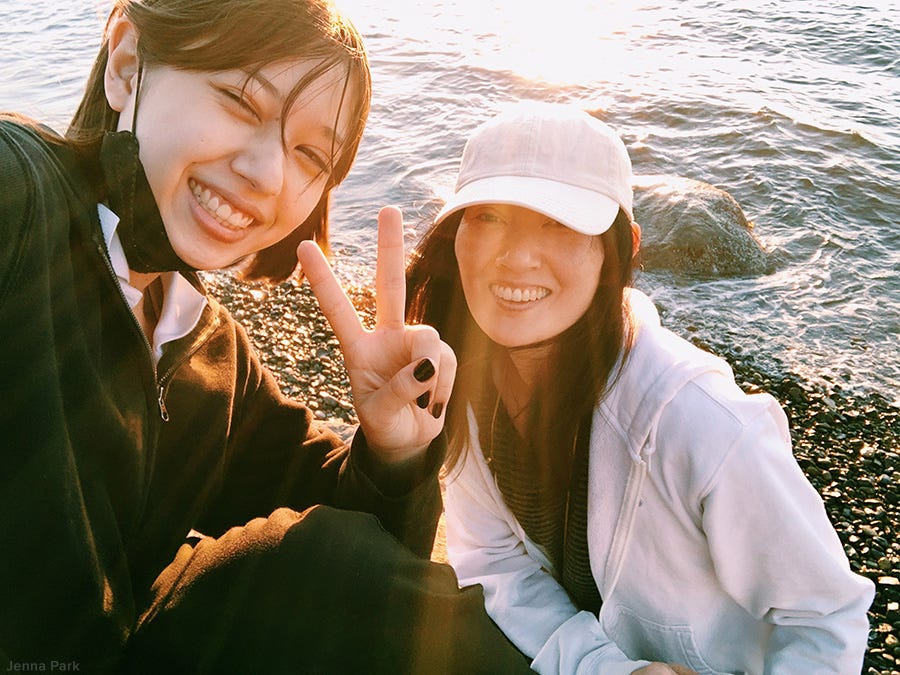
I’m 52.
Speaking of questionable fashion choices, ever since full-time WFH I just have to laugh at some of the homewear I find myself in, especially from the waist down on Zoom calls. I LOVE fashion, but in the spirit of “I don’t give a damn” I have nailed it at home.





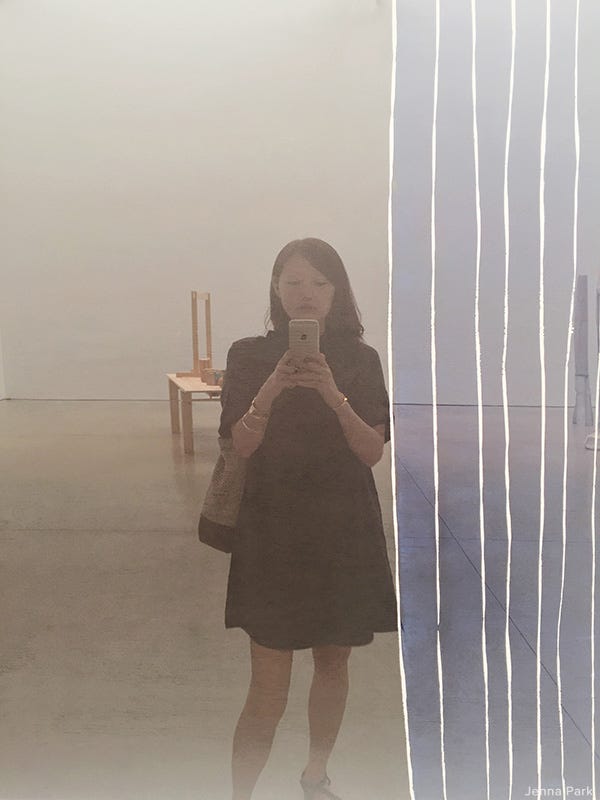

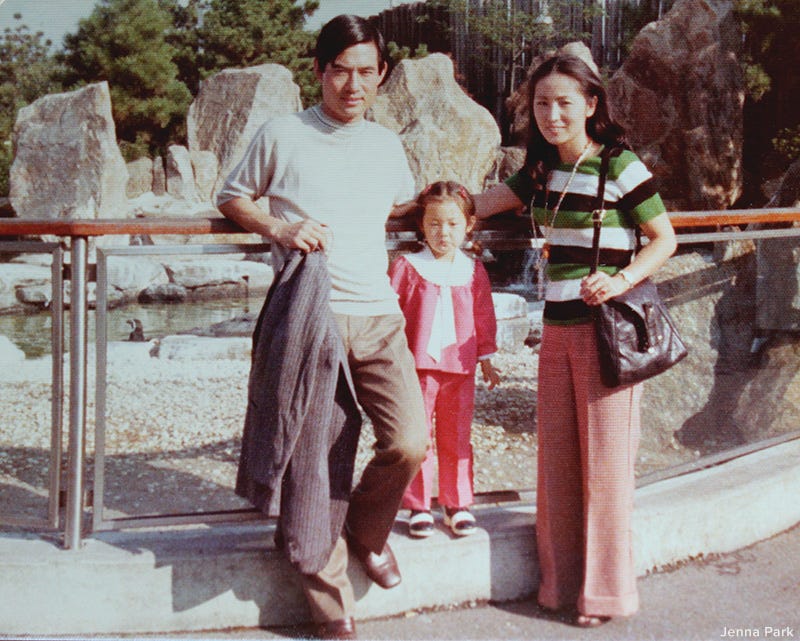
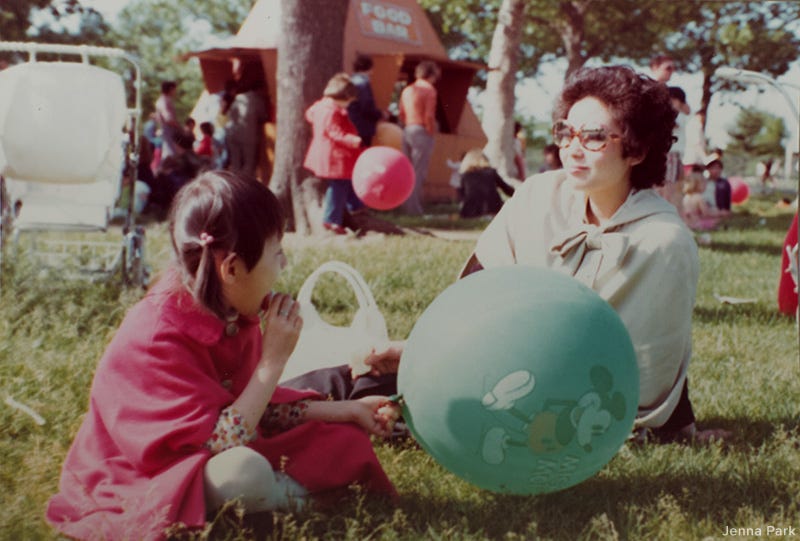
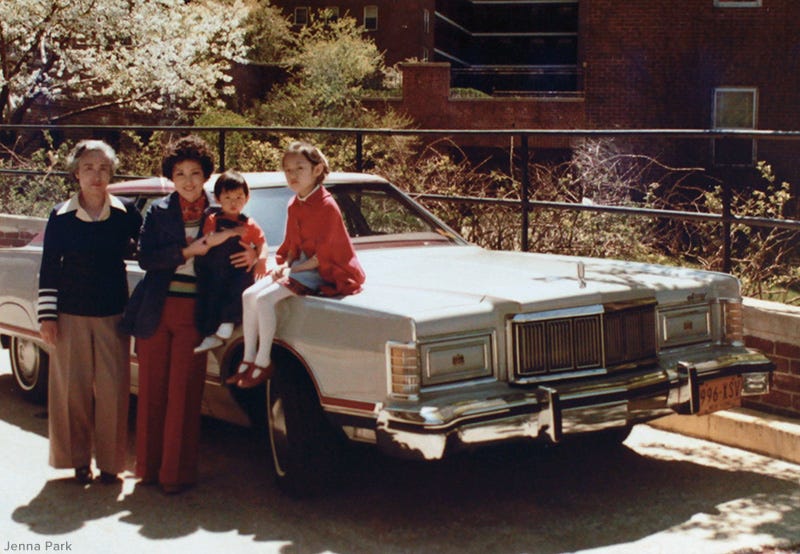
Very thoughtful piece, Jenna. Thanks
I’m turning 49 this week and ready to embrace my 50s. Is it true we have a distorted view of how we actually look like? Is that why whenever we see ourselves in photos, it’s alarming? Even with that lens do add 5lbs crap. Haha.